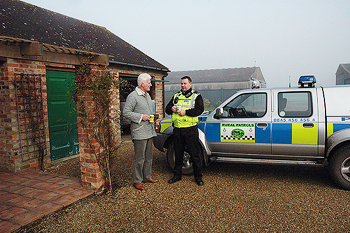Legal aid reforms will impact on shooting and fieldsports

The Ministry of Justice has released a consultation on its proposals to reform legal aid, with a consultation period of just six weeks.
The proposals mean that those relying on legal aid will be denied access to an experienced solicitor who has specialist knowledge of firearms laws or, for example, the Hunting Act.
Instead, defendants will be allocated a solicitor in the police station by either their date of birth or their surname.
Defendants will not be allowed to change solicitors except in exceptional circumstances.
It is expected that the number of firms with a legal aid franchise will drop from 1,600 to fewer than 400, with many small countryside solicitors being badly affected. Legal aid will be contracted out to companies such as G4S, Tesco and Eddie Stobart.
The firms will also be paid a fixed fee for each case, meaning that they will have a financial incentive if the defendant pleads guilty.
Peter Glenser, a barrister with expertise in firearms law, told Shooting Times: “These proposals will fatally damage access to specialist legal aid lawyers who know their subject. They will mean the end of the rural solicitors’ practice, and for shooters, that is an absolute disaster. Firearms law is specialist and complicated, and the penalties for getting it wrong are draconian — in some cases, a five-year mandatory minimum sentence. The changes proposed by the Ministry of Justice will encourage “pile ’em high, sell ’em cheap” supermarket law firms to make their clients plead guilty.”
“Let’s take an example: a stalker is arrested for armed trespass. He has every right to be where he is doing what he is doing, but the policeman is suspicious, so he is taken into custody. His house is searched, an old air rifle found and it is seized, along with all of his other firearms. They are all sent by the police to be examined, but the air rifle is not looked at for a few weeks and is stored in a cupboard, where it’s knocked about a bit. When the police expert examines it, it is found to be just over 12ft/lb, so it’s a Section 1 firearm. The offence is one of strict liability — it’s no defence to say that the stalker didn’t know it was over-powered, so he is charged with possession of a firearm without a certificate.”
“Will the supermarket firm have it looked at by its own expert, who may well say that the police can’t prove it was over-powered when it was in his possession as opposed to going wrong after it was chucked in the back of a police car?”
“In such a case, no offence has been committed.”
“Even if someone is arrested for a non-firearms-related matter, this may harm them. Supposing a malicious complaint is made by a disgruntled former partner or business rival. There may be no truth to it, but you may be advised to accept a caution or to plead guilty to something minor to ‘make it go away’. You accept the lawyer’s advice, and the next thing you know, your firearms certificate is revoked — and if you are a keeper, you lose your house and your job.”
Fieldsports organisations have also said that the proposed changes to legal aid could have a serious impact on shooters.
BASC’s Bill Harriman said: “BASC is concerned that the proposals to change legal aid could disadvantage ordinary people by denying them fair access to justice. They will restrict choice and lead to an inequality of arms between the state and the citizen. Defendants may no longer be properly represented by a competent lawyer of their choice, and miscarriages of justice could become more commonplace.”
A spokesman for the Countryside Alliance told Shooting Times: “The Alliance has serious concerns about the proposed changes to legal aid, and the ability to access legal support from lawyers with a knowledge of sometimes complex wildlife and firearms legislation. This is especially relevant when organisations such as the RSPB and the RSPCA are increasingly involved in criminal investigations because the police claim that they need expert support.”
The changes to legal aid come on top of changes to the rules on cost recovery which mean that defendants will only be paid costs at legal aid rates, which in turn means that someone prosecuted by, for instance, the RSPCA and using a specialist lawyer could end up with a legal bill for many thousands of pounds even if he were found not guilty.
To find out how to submit a response to the consultation, to contact your local MP, or to protest against the proposals, visit tinyurl.com/itsmychoice
Legal aid reforms will impact on shooting and fieldsports








